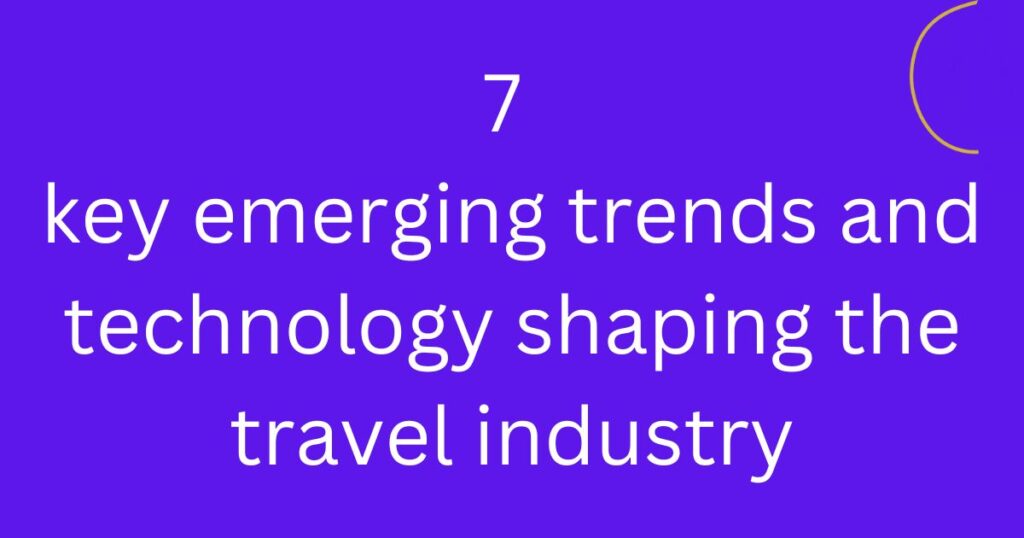Introduction
Table of Contents

You and I got our revenge on Covid- 19, I’m most excited we were able to get back at the deadly virus. A buzzword from this action is “revenge travel” coined to describe people’s desire to make up for the lost time as the industry reopens.
The months of social isolation and distancing led travel agents and enthusiasts into discovering ways to serve tourists and travellers better. The internet is saturated with information on technologies and use cases.
The pandemic showed us what we were missing and a lot of us were missing travel
Anna Belson, consultant and specialist in destination marketing and global tourism
To tackle this confusion, I have examined how trends have changed the travel industry over the last five years.
Read on to determine which trends will continue and new ones to watch out for!
Matt Goldberg speaking at the Phocus Wright conference in Phoenix mentioned that he looks forward to reimaging the future of travel- while “putting the consumer at the heart of the company’s operation.”
After experiencing the pandemic, the industry now understands what it means to scale up and down fluidly in a short-time
Steven M. Elinsion managing director, travel and hospitality AWS
Changing demands in the travel industry

1. Labour shortage: A report conducted in 2022 revealed that in the wake of the pandemic, some hospitality workers left for other jobs. The US Travel Association discovered that the industry is far behind in job recovery with 1.3 million jobs. Companies at this time turned to cloud-based technology and low touch solution to meet the needs of its customer.
2. Increase in guest expectations such as quality room service and quality amenities
3. Customers wants personalized experience such as digital room key, online ordering, immersive. experiences and payment
4. Luxury and mid-level consumers are spending more or the same than they did pre-pandemic
5. Many consumers are on the look for inclusive options. Such as getting a stay and being complimented with a free breakfast.
6. Consumers are getting creative with how they travel some opt for home swap
We’re seeing a lot of multi-generational travellers looking for ways to reconnect and they want to catch up on that lost time
Andria Godfrey, Senior Director of Vertical Solutions at Epsilon.
7. The World Travel and Tourism (WTTC) study found that 68% of travel companies believe cyber security will be a major threat to their business.
7 ways technology is changing the way we travel
Today, technologies such as AR/VR, blockchain, AI, IoT, biometrics, big data and cloud services are shaping the way we travel.
1. Personalized Experiences: With the advent of artificial intelligence and big data analytics, travel companies can gather and analyze vast amounts of data to understand individual traveler preferences. This enables them to offer highly personalized recommendations and tailored experiences, catering to the unique needs and interests of each traveler.
2. Seamless Booking and Planning: Technology has revolutionized the way we book and plan our trips. Online travel agencies, metasearch engines, and travel apps provide a seamless booking experience, allowing travelers to compare prices, find the best deals, and make reservations with just a few clicks. Advanced algorithms and machine learning algorithms also assist in predicting optimal travel times and suggesting the most efficient itineraries.
3. Enhanced Safety and Security: Technologies like biometrics, facial recognition, and fingerprint scanning are being integrated into airports and other travel hubs to improve security and streamline the boarding process. Additionally, advanced surveillance systems and AI-powered algorithms help in detecting and preventing potential security threats, ensuring a safer travel environment.
4. Virtual and Augmented Reality: Virtual reality (VR) and augmented reality (AR) technologies are reshaping the way we experience travel. VR allows travelers to explore destinations virtually, providing immersive experiences even before stepping foot on a plane. AR enhances the travel experience by overlaying digital information onto the real-world environment, offering interactive guides, historical information, and navigation assistance.
5. Internet of Things (IoT) and Smart Travel: The IoT enables connected devices and smart sensors to communicate and interact, leading to the concept of smart travel. Smart hotel rooms equipped with IoT devices offer personalized experiences, allowing guests to control room settings, access amenities, and request services using voice commands or mobile apps. IoT also facilitates real-time monitoring of transportation systems, providing accurate updates on schedules, delays, and disruptions.
6. Sustainable and Eco-Friendly Solutions: As sustainability becomes increasingly important, new technologies are emerging to promote eco-friendly travel. Electric vehicles, renewable energy solutions, and efficient transportation systems are being developed to reduce carbon emissions. Additionally, travelers can access platforms for carbon offsetting, eco-certified accommodations, and responsible tourism initiatives, promoting a more sustainable and responsible approach to travel.
7. Hyperloop and High-Speed Rail: Advancements in transportation technology are leading to the development of hyperloop systems and high-speed rail networks. These innovations promise to revolutionize long-distance travel by offering faster, more efficient, and environmentally friendly alternatives to traditional air and road transportation.
7 Key emerging trends and technology shaping the travel technology industry

According to the Hilton report, “The 2023 traveller; Emerging trends that are innovating the travel experience’ people are looking for “frictionless” travel to streamline their trips
The research discovered that 56% of travellers are seeking options that will make travel easier in 2023 and are embracing a combination of technology and human-led innovation that promises to do just this.
1. Mobile technology has revolutionized the travel industry, providing travelers with unprecedented convenience and accessibility. With the widespread adoption of smartphones and tablets, travel companies have developed mobile apps and platforms to cater to the evolving needs of tech-savvy travelers. These apps offer a plethora of functionalities, allowing users to book flights, hotels, and rental cars on-the-go, access real-time travel information, and manage their itineraries from a single device. The integration of GPS technology enables seamless navigation, providing travelers with turn-by-turn directions and suggestions for nearby attractions, restaurants, and services.
2. Big data has revolutionized the travel industry by providing valuable insights and improving decision-making processes. With the vast amount of data generated from various sources like bookings, customer interactions, social media, and reviews, travel companies can harness this information to enhance their operations and offer personalized experiences. One way big data is deployed in the travel industry is through customer segmentation and targeting. By analyzing customer data, travel companies can identify specific preferences, travel patterns, and behaviors, allowing them to tailor their marketing efforts and provide relevant recommendations to individual travelers.
3. Augmented Reality (AR) and Virtual Reality (VR) technologies are deployed in various ways to enhance the travel industry: For example, AR can provide real-time translations of signs and menus, making it easier for travelers to navigate foreign countries. It can also bring historical landmarks to life by overlaying virtual reconstructions of ancient structures or providing interactive storytelling experiences. Secondly, VR is transforming the travel industry by allowing users to virtually explore destinations before or instead of physically traveling.
4. Contactless Travel: In response to the COVID-19 pandemic, contactless travel has emerged as a significant trend. It involves minimizing physical touchpoints and implementing digital solutions such as mobile check-ins, electronic boarding passes, touchless payments, and biometric verification, ensuring a safer and more streamlined travel experience.
5. Sustainable Travel: Increasing environmental awareness has given rise to the trend of sustainable travel. Travelers are seeking eco-friendly options, such as choosing accommodations with green certifications, participating in carbon offset programs, opting for public transportation or electric vehicles, and supporting local communities. The travel industry is embracing sustainable practices to minimize its ecological footprint and preserve natural and cultural resources.
6. Blockchain technology has the potential to revolutionize the travel industry by providing transparency, security, and efficiency in various aspects of the travel journey. One of the key applications of blockchain in travel is in the area of smart contracts and payments. With blockchain, travelers can make secure and instant transactions without the need for intermediaries, such as banks or payment processors. This eliminates the risk of fraud and reduces transaction costs. Smart contracts can automate payment processes, ensuring that funds are released only when certain conditions are met, such as confirming the completion of a service or the arrival at a specific destination. Another area where blockchain is deployed in the travel industry is identity management and verification.
7. Web3, the next evolution of the internet, holds great potential for transforming the travel industry. With its decentralized, trustless, and transparent nature, Web3 can revolutionize various aspects of the travel ecosystem. One way Web3 is deployed in the travel industry is through decentralized booking platforms. These platforms leverage blockchain technology to eliminate intermediaries, enhance security, and ensure transparent transactions. Smart contracts facilitate automatic and secure payments, reducing the risk of fraud and providing travelers with greater control over their bookings.
FAQ
- What is travel technology?
Travel technology is the application of various technologies in the travel and tourism industry to enhance and streamline the travel experience. It encompasses a wide range of tools, platforms, and innovations that aim to make travel planning, booking, navigation, and overall travel management more convenient, efficient, and enjoyable.
2. What are the benefits of travel technology?
- Convenience
- Access to information
- Seamless transaction
- Personalization
- Improved communication
- Efficiency in travel management
- It has promoted sustainable practices
- It has enhanced global connectivity
3. Is there a future for the travel industry?
The travel industry has a promising future as it continually adapts to changing trends and embraces new technologies. With the desire for exploration and experiences remaining strong, people will continue to seek out travel opportunities. The industry’s ability to innovate and provide unique and personalized travel experiences ensures its longevity.
4. What are the ways technology is changing the way we travel?
- Personalized recommendations at your fingertips – travel tech uses AI to suggest tailored experiences based on your preferences.
- Explore the world from home – virtual reality brings destinations to life, allowing us to virtually travel and experience new places.
- Smart navigation and real-time updates – travel apps provide instant directions and keep us informed about delays, changes, and local attractions.
- Sustainable travel made easy – technology empowers us to make eco-friendly choices, from carbon offset platforms to eco-conscious accommodation options